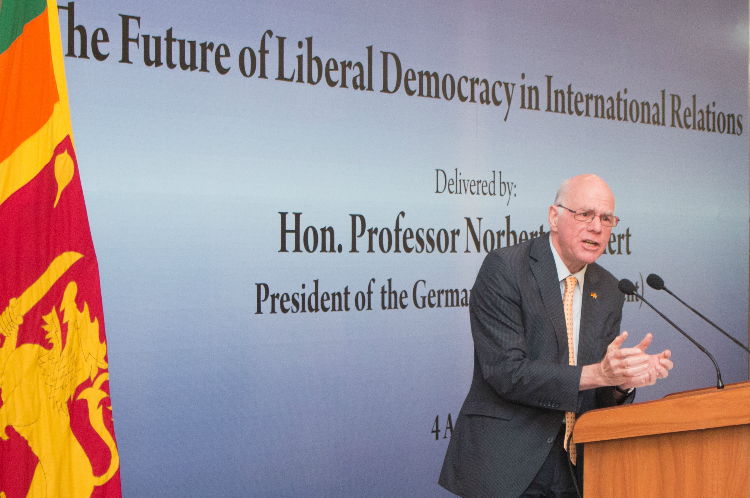Takeaways – Hon. Norbert Lammert on the Future of Liberal Democracy
May 16, 2017 Reading Time: 3 minutes

Reading Time: 3 min read
Three key Takeaways from the round table discussion with Hon. Professor Norbert Lammert’s-
- Globalisation has eroded the sovereignty of ‘nation states’. Equally, however, there is no ‘global state’ and such a structure is unlikely to emerge. The principles of liberal democracy are necessary to fill the gaps between existing and absent global structures.
- States have lost some influence over their internal affairs due to globalisation. Sharing sovereignty through unions like the EU enables states to retain some influence over their internal affairs.
- It is not the value of liberal democratic principles that is in jeopardy, but rather societal attitudes towards them. Innovative forms of international cooperation are required to sustain the principles of liberal democracy.
Introduction
- Hon. Professor Norbert Lammert, President of the German Bundestag, delivered a lecture at the Lakshman Kadirgamar Institute on 4 April 2017 on “The Future of Liberal Democracy in International Relations.” The Hon. Mangala Samaraweera, Minister of Foreign Affairs of Sri Lanka and Chairman of LKI, made the introductory address.
Takeaways from Hon. Professor Norbert Lammert’s Presentation:
Introduction
- Major assumptions that underpinned the post-war global order are losing their widespread acceptance. These assumptions include:
- Democracy is the only acceptable political system;
- Market economies are the only efficient economic system; and
- Treaty-based cooperation is the best form of inter-state cooperation
Evolution of the Principles of Liberal Democracy
- Thought needs to be given to the principles appropriate for organising our private, political, and economic relations. This stems from our understanding of the conflicting nature of different types of principles.
- The process of developing and establishing the principles of liberal democracy includes a discrepancy where societies and governments regard certain principles as indispensable, and violate them at the same time.
- However, violations of such principles have never led to the conclusion that liberal democracy is irrelevant to modern society. On the contrary, one could argue that, the greater the violation, the greater the indispensability of those principles.
- Therefore, it should be noted that societies are generally convinced that the principles of liberal democracy are vital, while keeping in mind that the temptation to violate them always exists.
- It is not the value of liberal democratic principles that is in jeopardy, but rather societal attitudes towards them.
- Innovative forms of international cooperation are required to preserve a positive attitude towards the principles of liberal democracy.
Liberal Democracy, Globalisation, and National Sovereignty
- The most significant effect of globalisation on nation-states has been the erosion of national sovereignty, and many of the current voices challenging liberal democracy are perhaps attempting to compensate for this erosion.
- While national sovereignty has been eroded, it is also unlikely that the emerging global community will evolve into a “global state”. Therefore, states must cooperate to fill in the gaps between the existing and absent political structures, to ensure better governance of our societies.
The European Union and Liberal Democracy
- Political and economic unions such as the EU offer a viable solution to the globalisation-driven loss of nation sovereignty.
- The sharing of sovereignty in such unions can compensate for the erosion of national sovereignty, and allow states to retain a certain level of control over their internal affairs.
- Since it is globalisation rather than the EU that erodes national sovereignty, it is unlikely that the UK will enjoy a higher level of national sovereignty simply by leaving the EU.
Populism and Liberal Democracy
- Open and democratically organised societies are experiencing a rise in populism.
- This is apparent with the emergence of populist parties and populist candidates (for presidencies and high government office) who attempt to provide simple solutions to complex problems.
Solutions to Global Challenges and Liberal Democracy
- The world is currently facing complex challenges to which there can be no simplistic solutions, despite the expectations and claims of populist parties and candidates.
- Many of the solutions to these challenges cannot be developed at the national level, but rather at the global level through collaboration.
- Global-level solutions are also necessary because any solution to these challenges will have global implications that need to be taken into account and addressed.
- Migration, digitalisation and financial markets are clear examples of issue areas where common solutions and regulatory frameworks at the global level are wanted and needed.
- Given the uncertainty of the direction of the US administration, Europe and Asia can no longer rely on US policies as they have in the past.
- The future of liberal democracy lies in finding intelligent types and formats for international cooperation to maintain its principles.
Click here to listen to Hon. Lammert’s lecture.
Click here to read the transcript of the lecture.
